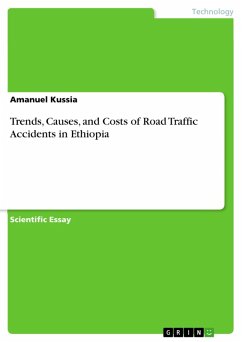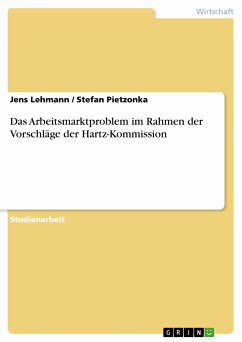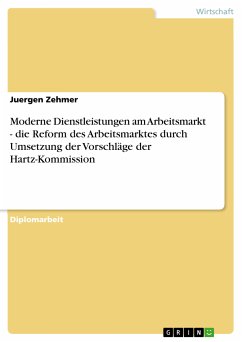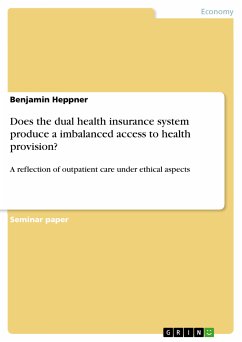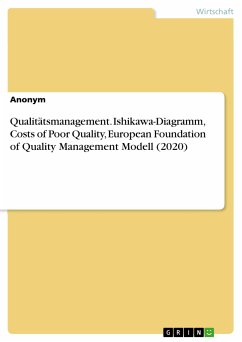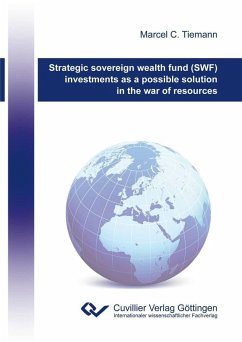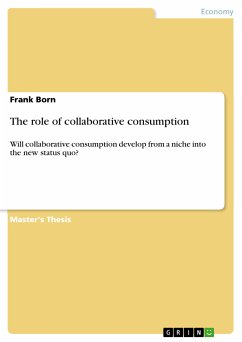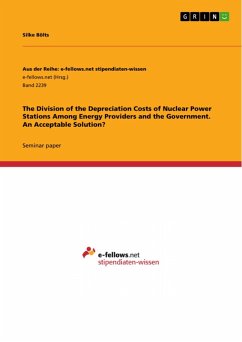
The Division of the Depreciation Costs of Nuclear Power Stations Among Energy Providers and the Government. An Acceptable Solution? (eBook, PDF)
Sofort per Download lieferbar
Statt: 18,95 €**
15,99 €
inkl. MwSt. und vom Verlag festgesetzt.
**Preis der gedruckten Ausgabe (Broschiertes Buch)
Alle Infos zum eBook verschenkenWeitere Ausgaben:

PAYBACK Punkte
0 °P sammeln!
**Preis der gedruckten Ausgabe (Broschiertes Buch)
Seminar paper from the year 2016 in the subject Business economics - Business Ethics, Corporate Ethics, grade: 2,3, Leuphana Universität Lüneburg, language: English, abstract: In 2001, the German coalition of the Green Party (Bündnis 90/ Die Grünen) and the Social Democrat Party (SPD) decided in consensus with all the other parties in the parliament, to end its involvement in atomic power. The consensus between politics and the energy providers entailed the structured withdrawal from nuclear energy. Therefore, a law was passed by the parliament in 2002, called "Gesetz zur geordneten Beendi...
Seminar paper from the year 2016 in the subject Business economics - Business Ethics, Corporate Ethics, grade: 2,3, Leuphana Universität Lüneburg, language: English, abstract: In 2001, the German coalition of the Green Party (Bündnis 90/ Die Grünen) and the Social Democrat Party (SPD) decided in consensus with all the other parties in the parliament, to end its involvement in atomic power. The consensus between politics and the energy providers entailed the structured withdrawal from nuclear energy. Therefore, a law was passed by the parliament in 2002, called "Gesetz zur geordneten Beendigung der Kernenergienutzung zur gewerblichen Erzeugung von Elektrizität". However, the government that followed (CDU/CSU and FDP) under Chancellor Angela Merkel first decided to extend the use of atomic power stations to an average of twelve extra years. But after the atomic accident in Fukushima, Japan in 2011, this decision was withdrawn. Instead, the coalition decided on a suspension of the oldest power stations and the phase-out of all stations by 2022. It goes without saying that not all stakeholders have been in favour of this decision. Especially the four largest German energy provider companies RWE, Vattenfall, E.ON and EnBW, who were all severely affected and are therefore trying to find ways to improve their situation. As ethics is a science that seeks to come closer to the truth by reflecting different options in a structured way3, the characteristics of a dilemma will be explained after an introduction to the topic. Then, the relationship of the topic to sustainability will be elaborated on. Subsequently, the question about the appropriateness of the decision by the commission will be discussed by comparing funding options for the withdrawal from nuclear energy, arguments in favour and against monetary support by the state. Then, the decision of the commission will be reviewed with regard to different concepts of ethics before being summarized in the conclusion.
Dieser Download kann aus rechtlichen Gründen nur mit Rechnungsadresse in A, B, BG, CY, CZ, D, DK, EW, E, FIN, F, GR, HR, H, IRL, I, LT, L, LR, M, NL, PL, P, R, S, SLO, SK ausgeliefert werden.




